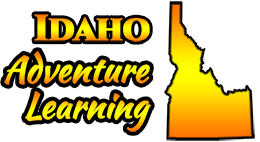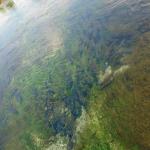Boise - Treasure Valley
Blog Posts
MILES Importance*
Maddie Pacold • Jul 14, 2017
I think the most important work MILES is doing is partnering with educators to spread the word about their research. After witnessing what you all did this week during your adventure learning workshop it is clear that you all are now more passionate and educated about our environment here in... more
Adventure Learning youtube channel
Mary Lugg • Jul 14, 2017
I can't believe the week is already over!!! Thank you so much to all of the in-person and on-line learners for showing up and striving to make this workshop meaningful. It was such a joy meeting you and reading everyone's thoughtful responses on the blog.
We created a youtube channel to... more
Wow! So close but not explored!
Stephanie Chamberlin • Jul 14, 2017
Can I just first say what a great week of learning this has been? I have so enjoyed working with Cindy, Sarah, Mary and all of my fellow teachers in this cohort. It has been fantastic, I have learned so much about the resources in our area and the importance of teaching about our socio... more
How Can I Use What I Learned as a Student With my Students?
Jenny Kaylor • Jul 14, 2017
The term socio economic systems (or SES) is a new term to me but not a new concept. However, I will say it is a new more collaborative approach to solving environmental issues today. Humans need resources that the environment provides and various ecological systems provide various economic... more
Final Wrap-up & Classroom Application
Allie Floyd • Jul 14, 2017
Wow, this week has flown by!!! We have managed to fit SO much into so a short amount of time it feels like it has been at least two weeks and I have loved EVERY minute of this workshop!!! I can't believe it's already Friday and I'm writing my final blog post... I wish we could keep... more
Resources
The Biology and Apiculture of Honey Bees: Adaptable Science Curriculum
Added by: Erin Tiderman
This is a great resource that focuses on the Biology and Apiculture of Bees. The curriculum examines the anatomy, physiology, and behavior of honey bees. It includes extensive reading dealing with the history of beekeeping. Agricultural activities with honey bees include: data collection and journaling, processing honey, extracting wax, and developing bee products. Inquiry and discussion with apiarists, entomologists, and audio and visual lectures and field trips are sources of additional information. A research paper, power-point presentation, or movie will be made by the student to demonstrate their accumulated knowledge as well as products from the hive.
Here is the link:
http://westvistaurbanfarmschool.blogspot.com/2009/02/kids-can-keep-bees-...
Resource type: Ideas for Activities
Exploring the "Systems" in Ecosystems
 Exploring the "Systems" in Ecosystems
Exploring the "Systems" in Ecosystems
Added by: Todd Thompson
Lesson idea for teachers introducing 6-8 grade students to ecosystems. Teachers can substitute some of the Yellowstone resources with those from Idaho.
Resource type: Other
Presenter Contact Information
Added by: Cindy Busche
A compilation of presenter contact information from Boise Adventure Learning 2017
Resource type: Contacts / Events, Other
Deer Flat National Wildlife Refuge Management Planning Presentation
Added by: Cindy Busche
Presentation by Susan Kain, Deer Flat National Wildlife Refuge Visitor Services Manager. The presentation covers how the Lake Lowell Comprehensive Management Plan was developed for multiple uses.
Resource type: Presentations
Idaho Supreme Court Cases regarding Cottonwood Creek
![]() 170710 Willson v Boise City.pdf
170710 Willson v Boise City.pdf
Added by: Cindy Busche
From Trout Unlimited: two Idaho Supreme Court cases that discuss the history of Cottonwood Creek flooding and the reasons for construction of the flume.
Resource type: Other
Lesson Plans
Is it possible to undo water pollution?
![]() Idaho Adventure Learning - Water Pollution.doc
Idaho Adventure Learning - Water Pollution.doc
Added by: Casey Weissenbach
Students participate in an experiment that will allow them to explore whether or not it is possible to undo water pollution caused by humans. Students will also work with an article about a local river and they will be expected to come up with an action plan on how they can limit or minimize water pollution in their communities.
Topic: Water Quality
Learning about Human-Environment Interaction through the Treasure Valley's water system.
![]() Human-Environment Interaction Lesson.doc (1).docx
Human-Environment Interaction Lesson.doc (1).docx
Added by: Emma Shannon
Students will learn about Human-Environment Interaction (one of the five themes of geography) through learning about the Treasure Valley's water supply and how two people altered our region's landscape forever.
Topic: Adaptation, Water Flow & Energy, Water Quantity/Budget
Habitat Health Lesson from Trout in the Classroom
![]() Trout in the Classroom Habitat Health.pdf
Trout in the Classroom Habitat Health.pdf
Added by: Cindy Busche
This lesson and student worksheet engages students in assessing habitat health using physical, chemical and biological parameters. From Trout in the Classroom curriculum.
Topic: Ecosystem Services, Fish/Aquatic Life, Water Quality
Designing a Solution for Pollution
![]() Designing a Solution for Pollution.doc
Designing a Solution for Pollution.doc
Added by: Angela Becker
Students will identify an area in their community that does not employ Best Management Practices (BMP) (ex: a parking lot with storm drains located within or along the edges of the pavement). They will document (through pictures and research) what could be improved to reduce the amount of point and non-point source pollution from that area. Students will then design an improvement plan for that area that they will present to their peers.
Topic: Water Quality
How Can You Save Water?
Added by: Kelly Demers
Students will develop an understanding of where our water comes from, ways water is wasted, and how we can conserve water. They will then write an informational essay about ways to save water with a topic sentence, supporting details, and a conclusion.
Topic: Climate Change, Ecosystem Services, Water Flow & Energy, Water Quantity/Budget, Other

